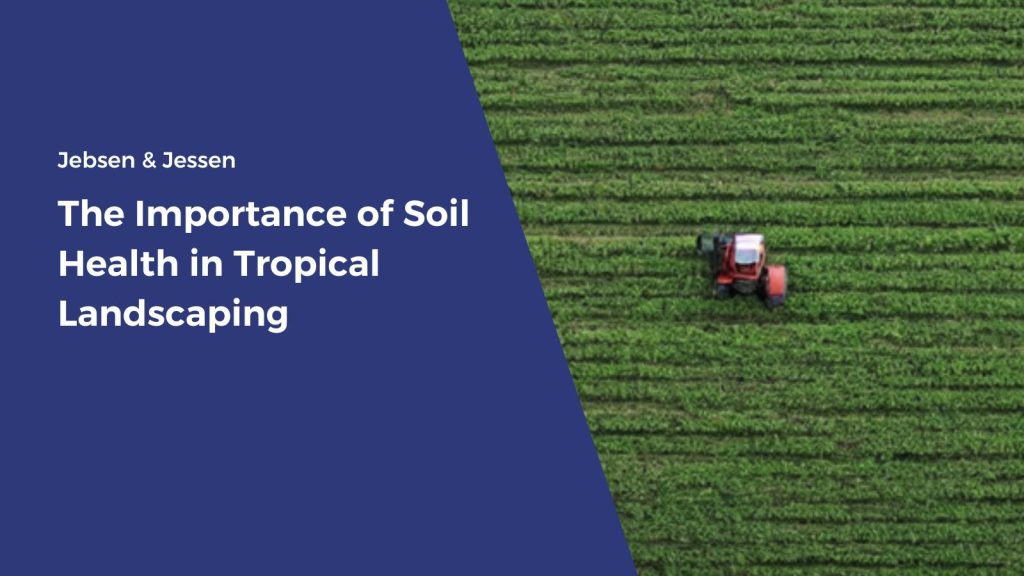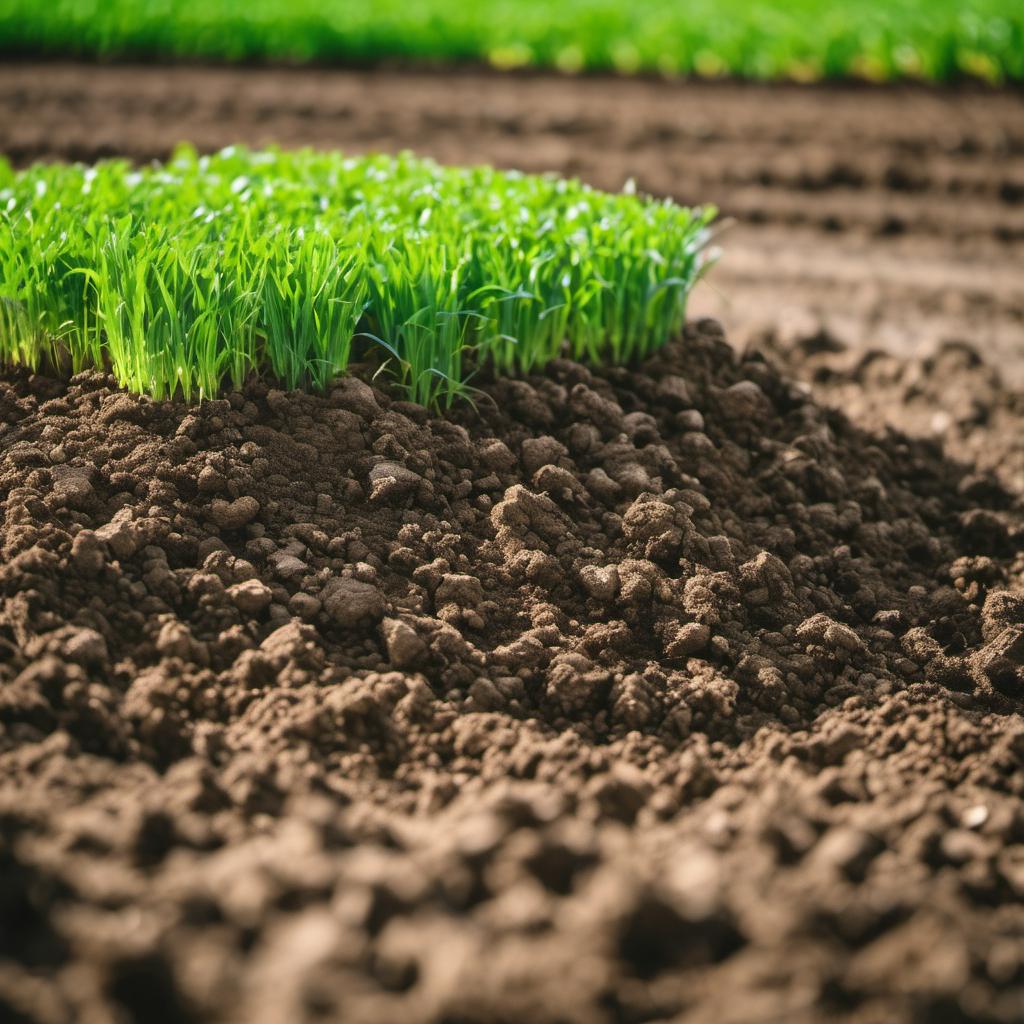Tropical climates present unique challenges for landscaping and maintaining healthy soil. With heavy rainfall, humidity, and consistently warm temperatures, tropical garden soil faces issues like compaction, erosion, nutrient deficiencies, and more. However, with proper care and amendment, you can cultivate rich, thriving soil essential for a vibrant landscape.
Understanding Soil Health
Healthy soil is the foundation of every successful garden. It provides nutrients, anchors plants, retains water, and allows space for air pockets and beneficial microorganisms. Unhealthy soil will limit plant growth and create an unsightly, poorly performing landscape.
Some key indicators of healthy tropical soil include:
- A loose, crumbly texture that allows water drainage and oxygen circulation.
- Abundance of organic matter from materials like compost, mulch, and manure. This boosts nutrients, water retention, and soil life.
- Neutral pH between 6.0-7.0. Acidity or alkalinity outside this range makes nutrients unavailable to plants.
- Presence of macro and micronutrients like nitrogen, phosphorus, and iron. These nourish plants throughout their lifecycle.
- High levels of beneficial fungi, bacteria, earthworms, and other organisms keep soils alive.
Tropical garden soils often suffer deficits in these areas for reasons like heavy rain, unprotected topsoil, and inadequate organic content. With thoughtful amendments, you can dramatically enhance garden soil quality.
Best Practices for Soil Improvement
Fortunately, there are many straightforward, eco-friendly techniques to improve soil structure and replenish nutrients in tropical landscapes:
Incorporate Compost
Compost feeds soil microorganisms, improves drainage and moisture retention, and supplies a balanced range of essential plant nutrients. Work 1-2 inches of compost into garden beds before each new planting. Over time, this organic matter will enrich the soil.
Use Cover Crops and Green Manures
Cover crops like cowpeas, peanuts, and clover prevent erosion, suppress weeds, and help build organic matter when tilled under. Green manures like alfalfa, lablab, and sunn hemp add to the nitrogen plants’ need. Incorporate these soil-enhancing plants into your tropical landscaping schedule.
Apply Well-Aged Manure
Manures like horse, chicken, steer, and rabbit enrich soil texture. Ensure manures have aged at least 6 months before applying; fresh manures may burn plants. Work 1-2 inches into soil 2-3 weeks before planting.
Mulch Beds
Mulching with materials like wood chips, straw, leaves, or grass clippings cools the soil, retains moisture, and prevents erosion during heavy rains. Replenish mulch 2-3 inches deep twice per year.
Aerate Compacted Areas
Use an aerator machine or garden fork to create air channels in overly compacted clay-like soil. Aerating improves drainage and allows roots to spread more deeply.
Grow Cover Crops
Cover crops like cowpeas, peanuts, and clover prevent erosion, suppress weeds, and build organic matter when tilled under. Their roots also help break up compacted soil.
The Role of Chemicals and Fertilizers
While organic methods are ideal, chemical amendments can provide a quick boost while your soil improves naturally over time. Use them judiciously and follow all label instructions carefully.
pH Adjusters
Test soil pH annually. If it is too acidic or alkaline, apply lime or sulfur several weeks before planting to reach the desired neutral pH range.
Soil Enhancing Chemicals and Fertilizers
Standard NPK (nitrogen-phosphorus-potassium) fertilizers quickly replenish depleted nutrients. Apply at half strength and re-test in 3-6 months to prevent over-fertilization.
Micronutrients
If tests show particular deficiencies in iron, magnesium, calcium, or other micronutrients, use supplements formulated for your region to restore optimum levels.
Pesticides and Herbicides
Only use pesticides or herbicides if facing a severe, non-responsive pest outbreak. Spot-treat specific areas rather than blanket application. Always follow safety and disposal protocols.
The Long-Term Benefits of Healthy Tropical Soil
Caring for your tropical garden soil pays beautiful dividends over time. Landscapes with rich, balanced, living soil are more drought-tolerant, resistant to pests and diseases, and far easier to maintain. Plants thrive with less effort or intervention. Even heavily degraded soil can be transformed through consistent organic soil amendment.
There are profound environmental benefits as well. Healthy soils act as carbon sinks, removing greenhouse gases from the atmosphere. They absorb and filter rainwater, protecting groundwater supplies. Tropical landscaping practices eliminate chemical runoff that pollutes local waterways and ecosystems.
Simplot Bermudagrass Special: Targeted Fertilization for Optimal Turf Health
Simplot Bermudagrass Special is a specialty fertilizer tailored to meet the nutritional needs of Bermudagrass in tropical environments. It provides balanced nutrition to promote optimal growth and resilience.
What It Does
- Contains 20% nitrogen for vigorous green growth
- Phosphate at 5% to stimulate substantial root development
- 30% potassium for improving drought tolerance and disease resistance
- Chelated micronutrients like iron, manganese, magnesium, and zinc to ensure efficient nutrient utilization
How It’s Used
- Apply at a rate of 1 pound per 1000 sq ft, adjusting based on turf response
- Can be applied through irrigation injection or spray equipment for versatility
- For sprayers, calibrate to deliver proper rates according to label guidelines
Soil Health Benefits
- Optimized nutrition tailored specifically for Bermudagrass varieties
- Chelated micronutrients for efficient uptake and utilization
- Strengthened root system through phosphate
- Improved stress and disease tolerance through optimal potassium nutrition
Syngenta Monument 75 WG: Strategic Weed Control with Minimal Impacts
Syngenta Monument 75 WG is a highly effective herbicide for managing weeds in tropical turf while minimizing environmental impact.
What It Does
- Controls a wide spectrum of grassy and broadleaf weeds
- Absorbed both through leaves and roots for thorough control
- Highly concentrated formula allows low use rates of just 15-40 g/ha
How It’s Used
- Apply selectively only where weed control is needed
- Follow label instructions carefully for rates based on weed type
- Monitor weed pressure and only apply as required
Soil Health Benefits
- Low toxicity and use rates minimize risks of chemical runoff
- Preserves refuges for beneficial species when applied selectively
- Controls competitive weeds that can deprive the grass of nutrients and light
Syngenta Primo MAXX: Regulating Growth Patterns for Superior Turf
Syngenta Primo MAXX regulates turfgrass growth patterns to improve density, texture, and garden soil quality in tropical conditions.
What It Does
- Contains trinexapac-ethyl to regulate gibberellic acid and reduce vertical growth
- Drives lateral growth instead for increased turf density
- Less vertical growth means up to 50% less frequent mowing
How It’s Used
- Apply according to label rates and timing recommendations
- Compatible with various mowing regimens and turf types
- Make repeat applications on the label schedule for sustained effects
Soil Health Benefits
- Thicker turf canopy filters more rainfall, preventing erosion
- Denser root mass for better nutrient uptake
- Slowed top growth reduces nutrient demand on soil
- Less mowing means less traffic and soil compaction
Syngenta Qualibra: Balancing Soil Moisture for Healthy Roots
Syngenta Qualibra improves soil moisture distribution and retention for healthier turfgrass.
What It Does
- Contains a synergistic penetrant and polymer combo
- Pulls excess moisture down from saturated upper layers
- Retains moisture in lower layers to prevent drought stress
How It’s Used
- Apply according to label rates based on soil type
- Reapply as needed to maintain soil moisture balance
- Use alongside good irrigation practices
Soil Health Benefits
- Alleviates cycles of oversaturation and drought in soil
- Allows turf roots consistent access to evenly distributed moisture
- Promotes a substantial increase in root mass
- Healthier roots improve nutrient uptake and anchoring
Conclusion
Creating and caring for landscapes in the tropics comes with unique difficulties due to heat, rain, and marginal soil. However, following sustainable practices tailored to improve soil health allows gardens to thrive in tropical conditions. Building soil biology and fertility through organic matter, biodiversity, and responsible enhancements provides the foundation for robust plant and turf growth. With informed effort, it is possible to cultivate world-class tropical landscapes that stand up to the climate while enhancing the environment.




